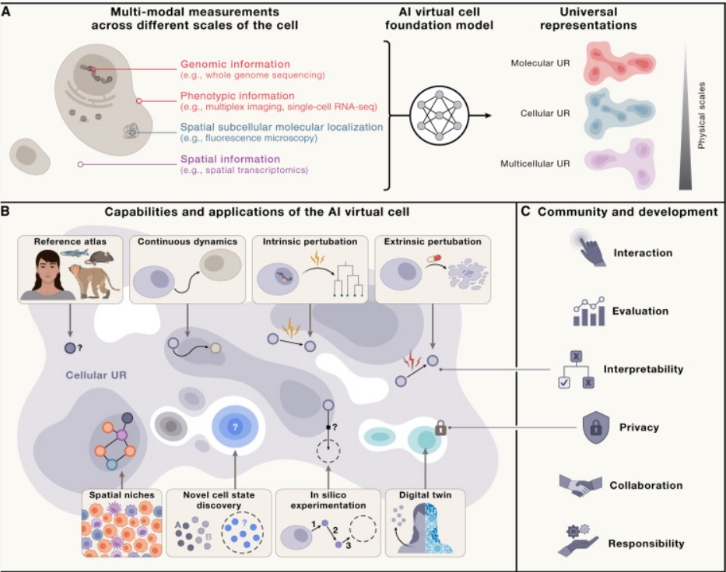Stanford University, Genentech and the Chan Zuckerberg Foundation collaborated to publish an opinion article in the journal Cell, proposing a breakthrough idea of using artificial intelligence (AI) technology to develop the world's first virtual human cells. This research aims to build "artificial intelligence virtual cells" (AIVC) through AI and omics technology, using multi-scale and multi-modal modeling methods to overcome the limitations of traditional cell models, accelerate scientific research discoveries, guide experimental research, and Promote interdisciplinary collaboration and drive profound changes in biological research. The project is jointly led by top scientists from different fields, indicating the huge potential of AI technology in the biomedical field.
Recently, Stanford University, Genentech and the Chan Zuckerberg Foundation jointly published an opinion article in the journal Cell, proposing the idea of using artificial intelligence (AI) technology to develop the world's first virtual human cells.
The groundbreaking study was co-authored by scientists including Stanford professor of bioengineering Stephen Quake, professor of computer science Jure Leskovec, Theofanis Karaletsos, director of scientific artificial intelligence at the Chan Zuckerberg Foundation, and Aviv Regev, executive vice president of research at Genentech.

Traditional cell models are often unable to accurately simulate and model the complex functions and behaviors of cells, which limits the depth and breadth of scientists' research in the field of biology. Therefore, the research team proposed the concept of building "artificial intelligence virtual cells" (AIVC) through AI and omics technology. AIVC utilizes multi-scale and multi-modal modeling methods to accelerate scientific discovery, guide experimental research, promote interdisciplinary collaboration, and promote profound changes in biological research.
It is reported that the development of virtual cells provides scientists with new research tools to help them better understand the mechanisms of health and disease. With the help of AI technology, scientists can more accurately simulate and predict cell behavior, thereby significantly improving the speed and efficiency of biological research and providing strong support for the exploration of disease mechanisms and the development of new treatments.
With the advent of this virtual cell, the application of AI technology in the field of biology has ushered in unprecedented opportunities. This innovation not only promotes in-depth cell research, but also opens up new paths for scientists in disease treatment and health management.
Paper address:
https://linkinghub.elsevier.com/retrieve/pii/S0092867424013321
The development of virtual human cells marks a milestone in the application of artificial intelligence in the biomedical field. It provides new directions and hopes for future disease research and treatment, and deserves continued attention for its subsequent development.